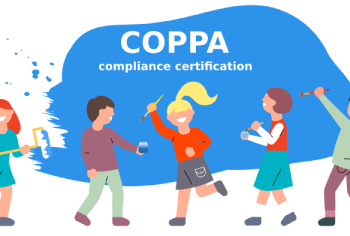COPPA Compliance Certification
COPPA compliance certification is mandatory to websites and apps that count under-13 users. Such businesses collect personal information from the minors, and therefore, must comply with the FTC-enforced Children's Online Privacy Protection Act (COPPA). For web operators to be considered COPPA-compliant, they must demonstrate that they endeavor to protect the online safety and privacy of under-13 users.

COPPA gives parents and guardians of minors below 13 years control over what data can be collected from the young ones by online marketers, websites, and other web operators. Consequently, verifiable parental consent ought to be sought before web operators ask under-13 users to provide their personal information.
Web operators have an obligation towards under-13 users as well as their parents. To guarantee a valuable online experience for minors, web operators must adhere to data safety and security practices. Likewise, they must regularly audit their systems to ensure that they comply with COPPA.
The COPPA Compliance Certification Process
The COPPA Safe Harbor program issues compliance certification. The process typically gets conducted in three phases. The assessment phase evaluates web operators’ privacy policies, and data flows to ascertain that they adhere to COPPA requirements. After the assessment, a findings report should be prepared. The report outlines steps that ought to be taken to achieve compliance.
Based on information gathered during the assessment phase, the website operators will be guided through a remediation process so that necessary changes are made to their privacy policies and data flows. Once the required changes are made, a letter of attestation will be issued, showing that the web operator adheres to COPPA guidelines.
COPPA Compliance Certification Importance
Previously, very few web operators used to think about the safety of under-13 users when designing their sites. Thanks to COPPA, you cannot afford to make this mistake. With more kids online, web operators must implement better data privacy and security protections.
COPPA non-compliance puts you on the collision path with regulatory bodies, besides putting you at the risk of reputational loss. Non-compliance fines are as high as $41,484 per violation. With COPPA compliance certification at hand, there’s no second-guessing when it comes to handling under-13 users.
COPPA compliance certification attests that a company has met and exceeded federal regulations regarding minors’ data security and safety. With customized support from compliance experts, it becomes easier to meet industry best practices and achieve compliance in today’s dynamic data privacy landscape.
Demonstrating Your Commitment to Kids’ Online Safety
To achieve COPPA compliance certification, you first need to get assessed. Here are some parameters that determine whether your website is compliant or not.
Transparency
One of the core COPPA requirements is that you must be transparent with under-13 users and their parents about the information that you collect from them. In this regard, your online service or website should have a comprehensive privacy policy that explains your data collection and handling practices.
Parental Consent in COPPA Compliance Certification
Parents, rather than website operators, must remain in control of data collected from under-13 users. Before collecting personal information from minors, websites, and other online services must notify their parents and seek consent. The notice should explain why the minors’ data is being requested and how it will be used.
To achieve COPPA compliance certification, web operators should show proof that they provide parents/guardians with reasonable means of reviewing data collected from their kids. Likewise, parents can request to have the data deleted, and may also ask the operator of a website/online service to stop collecting data from their kids. Failure to comply with this directive puts you on the path of non-compliance.
Data Security
Website operators and other providers of online services should only collect data needed to deliver a promised feature, service, or product to kids. Therefore, they should try to minimize the data that they collect. They should also allow the kids and their parents to amend or correct the data. Besides adhering to data minimization practices, website operators should avoid retaining the collected data longer than it’s necessary.
Third-parties and other service providers ought to have procedures for ensuring the confidentiality, integrity, and security of data collected from under-13 users by websites. It is advisable to list these procedures in the privacy policy so that parents and their kids know about them too. When deleting data that has lost its usefulness, reasonable measures should be taken to prevent loss or exposure to unauthorized individuals.